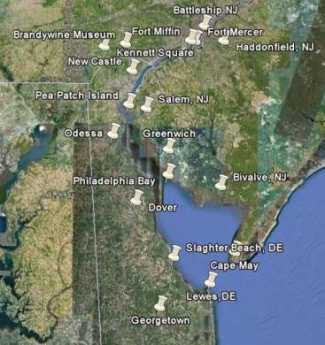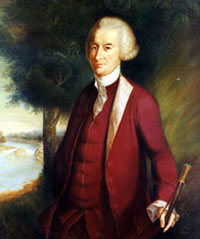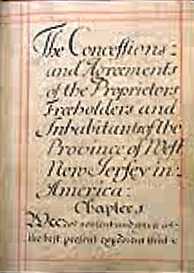Related Topics
Delaware (State of)
 Originally the "lower counties" of Pennsylvania, and thus one of three Quaker colonies founded by William Penn, Delaware has developed its own set of traditions and history.
Originally the "lower counties" of Pennsylvania, and thus one of three Quaker colonies founded by William Penn, Delaware has developed its own set of traditions and history.
Philadelphia Legal Scene
The American legal profession grew up in this town, creating institutions and traditions that set the style for everyone else. Boston, New York and Washington have lots of influential lawyers, but Philadelphia shapes the legal profession.
Quakers: All Alike, All Different
Quaker doctrines emerge from the stories they tell about each other.
Revolutionary Philadelphia's Patriots
All kinds of people were patriots in 1776, and many of them were all mixed up about what was going on and how they stood. Hotheads in the London Coffee House stirred up about an inoffensive Tea Act, Scotch-Irish come here to escape the British Crown, the local artisan class and the local smuggler class, unexpectedly prospering under non-importation, and the local gentry -- offended to be denied seats in Parliament like other Englishmen. Pennsylvania wavered until Ben Franklin stepped forward with a plan.
Causes of the American Revolution
Britain and its colonies had outgrown Eighteenth Century techniques of governance. Unfortunately, both England and America lacked the sophistication to make drastic changes smoothly.
Land Tour Around Delaware Bay
 Start in Philadelphia, take two days to tour around Delaware Bay. Down the New Jersey side to Cape May, ferry over to Lewes, tour up to Dover and New Castle, visit Winterthur, Longwood Gardens, Brandywine Battlefield and art museum, then back to Philadelphia. Try it!
Start in Philadelphia, take two days to tour around Delaware Bay. Down the New Jersey side to Cape May, ferry over to Lewes, tour up to Dover and New Castle, visit Winterthur, Longwood Gardens, Brandywine Battlefield and art museum, then back to Philadelphia. Try it!
Lumpers, Splitters and Technicians: The Framers of the American Constitution
 Half a dozen distinguished colonists came to believe the thirteen American colonies could not survive unless they banded together. Eight years of bitter experiences during the Revolutionary War had taught them they must unite. We might call them lumpers.
Half a dozen distinguished colonists came to believe the thirteen American colonies could not survive unless they banded together. Eight years of bitter experiences during the Revolutionary War had taught them they must unite. We might call them lumpers.
John Dickinson, Quaker Hamlet

|
| John Dickinson |
John Dickinson (1732-1808) would probably be better known if his abilities were less complex and numerous. It would have been particularly helpful if he had consistently remained on only one side of the important issues of his day. Born in a Quaker family and buried in a Quaker graveyard, he was for years a notable Episcopalian and soldier. He outwitted John Penn, the Pennsylvania Proprietor who was trying to keep Pennsylvania from sending representatives to the Continental Congress, by having the Pennsylvania representatives hold a meeting in the same small room of Carpenters Hall at the same time as the Congress. But he ultimately refused to sign the Declaration of Independence. Although he was the main author of the Articles of Confederation, the Constitution which replaced it would not have been ratified without his idea of a bicameral Congress. Although he was Governor of Pennsylvania, he was also Governor of Delaware, has been the central figure in the separation of the two states. In fact, for fifteen years he was a member of the Legislature of both states. Dickinson seems in retrospect to have been on every side of every argument, but he was immensely respected in his time.
Two events seem to have been central in the organization of his life. The first was his education as a lawyer. At that time and for a century afterward, lawyers were trained by apprenticeship. Dickinson, however, studied in London at the Inns of Court for four years and was by far the most distinguished lawyer in North America for the rest of his life. Furthermore, he absorbed the principles of the Magna Carta and the approaches of Francis Bacon so thoroughly that he never quite got over his pride in his English heritage. Throughout his leadership of the colonial rebellion, he acted as a better Englishman than the English themselves. His demand was for American representation in the British Parliament, not independence from England. It would not be hard to imagine Dickinson standing before a firing squad, gritting the words of St. Paul, Civis Romani Sum.
His other pivotal experience was the Battle of Brandywine. Dickinson had been the organizer or chairman of the two main Pennsylvania military organizations, the Pennsylvania Committee of Safety and Defense, and the so-called Associators (today's 111th Infantry, the first battalion of troops in Philadelphia). Both of these particular names were a characteristic gesture to conciliating pacifist Quaker feelings. Nevertheless, when Dickinson refused to sign the Declaration, he did temporarily become so unpopular he resigned his military commands. A few months later, when General Howe landed at Elkton at the narrow neck of the Delmarva peninsula, Dickinson enlisted as a common soldier to defend the southern perimeter of the defense line Washington had hastily thrown up to defend Philadelphia. Shortly afterward, Dickinson's friend and neighbor Caesar Rodney made him a Brigadier General in charge of the garrison around Elizabeth New Jersey, but the Battle of Brandywine taught an important lesson. Little states like Delaware and Maryland could not possibly defend themselves witho
Originally published: Wednesday, October 27, 2004; most-recently modified: Sunday, July 28, 2019
| Posted by: Richard Dickinson | Mar 1, 2014 5:51 PM |
| Posted by: Savannah | Feb 14, 2008 4:26 PM |
